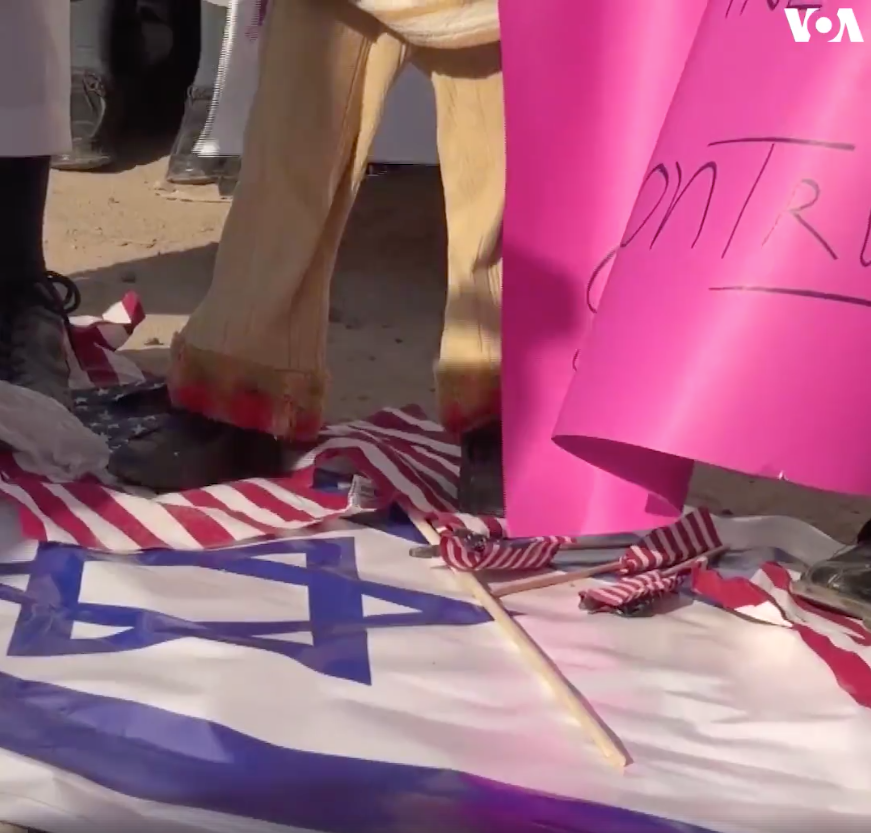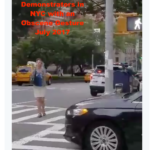BBG Watch Commentary
The Voice of America (VOA) has posted multiple raw videos without any commentary or context showing burnings of American and Israeli flags (screenshot above and below) in protests against President Trump’s decision to move the U.S. embassy to Jerusalem. They attracted many more “likes” than other VOA social media posts.
In 2013, then Secretary of State Hillary Clinton called VOA’s parent agency, the Broadcasting Board of Governors (BBG), “practically defunct.” Chairman of the House Committee on Foreign Affairs, Rep. Ed Royce (R-CA)” described the BBG as “dysfunctional” and together with the committee’s Ranking Member, Rep. Eliot Engel (D-NY), proposed a number of bills and solutions designed to reform U.S. international media outreach.
The BBG still does not have a permanent CEO nominated by the President and confirmed by the U.S. Senate. The agency is still run by the same Obama administration executives who were there in 2015, 2016, and 2017. They are assisted by the entrenched management team which has made the BBG to become the agency with the lowest employee morale in the federal government. While other agencies at the bottom have made progress, the BBG sank lower in the employee morale rankings in 2017 compared to others in the same agency size category.
Helle C. Dale, the Heritage Foundation’s senior fellow in public diplomacy who will moderate an upcoming panel discussion on “Public Diplomacy Challenges for the Trump Administration,” wrote in a recent commentary that “A growing chorus of critics is demanding the Trump administration get on with the business of reforming the Broadcasting Board of Governors and the vast international broadcasting complex it oversees on behalf of the U.S. government.”
A VOA reporter posted a meme of Donald Trump on a public Facebook page depicting him as a fascist — one of many such posts by some of VOA reporters on their personal social media accounts and in other public settings.
Many Iranians, including the son of the late Shah, said that one-sided VOA reporting “helps the Iranian regime stay in power.” A Rand Corporation scholar voiced the same conclusion at the Atlantic Council panel.
One of VOA’s top commentators on Iran showed what appeared to be an obscene gesture to anti-Iranian regime protesters in New York and later continued to comment for VOA on Iran developments.
In an apparent appeal for less government transparency, one of the panelists who has worked for the Broadcasting Board of Governors argued in an op-ed that YouTube should not describe VOA as being funded by the U.S. government, while in a public Facebook post the VOA director seemed to have disagreed with the Trump administration’s decision to require Russia’s propaganda outlet RT to register in the U.S. as a foreign agent.
Three VOA Mandarin Service reporters are threatened with firing for disagreeing with senior management’s decision to cut short an interview with a critic of the Chinese communist government. Some of the best known China scholars in the U.S. have come to their defense.
There have been thousands of social media comments from Chinese and Iranian users showing a decline of VOA’s and Radio Farda’s credibility.
Radio Free Europe/Radio Liberty (RFE/RL) President Tom Kent said that RFE/RL’s coverage “will also have reflected why people support him [Vladimir Putin] and the strength that he has brought to the campaign and to the country.” Some of the best RFE/RL investigative reporters have quit the media outlet and said that the senior management “kills journalism, incentive and values we do this job for.”
These are just some of the public diplomacy challenges for the Trump administration that may come up at the Heritage Foundation panel “Public Diplomacy Challenges for the Trump Administration“ on Tuesday, March 20, 2018.
Meanwhile, Obama era officials in charge of the Broadcasting Board of Governors (BBG) nearly $700 million a year federal agency and its longtime managers insist in a press release that “U.S. government’s media agency targets Russian disinformation and Iranian censorship; BBG at the forefront of National Security Strategy implementation.”
The BBG press release includes what critics say are highly misleading audience estimates. The BBG included in them audiences to self-censored content for countries with censorship, possibly also audiences in the U.S.,which is against the intent of Congress, as well as total views to click bait videos or videos with anti-U.S. or pro-Putin messages being shown to Russian-speaking audiences to obscure the fact that RFE/RL-VOA Russian-language TV program “Current Time” has minuscule web traffic in Russia. After seeing the dismal Facebook LIVE numbers for BBG’s “Current Time,” Andrew Beaujon concluded in an article in The Washingtonian:
“…if you worked at a conventional network, numbers that small might make you leap off the nearest onion dome.”
The BBG claims to focus on impact but does not show any measurements of actual change of perceptions. The popularity of VOA’s raw videos showing the burning of U.S. and Israeli flags may indicate that the impact is the opposite of what most American taxpayers would desire.
The Broadcasting Board of Governors also happens to be the worst-managed federal agency in its size category, with the lowest employee morale and the lowest employee rating of the agency’s leaders, according to the Office of Personnel Management (OPM) Federal Employee Viewpoint Surveys (FEVS).
END OF BBG WATCH COMMENTARY
###
Heritage Foundation Announcement
EVENT
March 20, 2018
Public Diplomacy Challenges for the Trump Administration
Fake news, information warfare, terrorist recruitment, Russian interference in U.S. elections – never have the challenges been greater facing the Public Diplomacy institutions of the U.S. government, charged with conducting “the war of ideas.”
Featuring Opening Remarks by
Edwin J. Feulner Ph.D.
Founder
Hosted by
Helle C. Dale
Senior Fellow for Public Diplomacy
@Helledale
Agenda
Panel 1 – The State Department and the BBG: Urgent Need for Reform
Dr. John Lenczowski, President, Institute of World Politics
Haroon K. Ullah, Chief Strategy Officer, Broadcasting Board of Governors
Thomas M. Hill, Visiting Fellow in Governance Studies, The Brookings Institution
Helle C. Dale, Senior Fellow for Public Diplomacy, The Heritage Foundation – Moderator
Panel 2 – The Influence Space: Challenges from Abroad
Ilan I. Berman, Senior Vice President, American Foreign Policy Council
Mark A. Stokes, Executive Director, Project 2049 Institute
Helle C. Dale, Senior Fellow for Public Diplomacy, The Heritage Foundation
Luke Coffey, Director, Douglas and Sarah Allison Center for Foreign Policy Studies, The Heritage Foundation – Moderator
March 20, 2018
10:00 am – 1:00 pm
Live Streamed
The Heritage Foundation
Lehrman Auditorium
214 Massachusetts Ave NE
Washington, DC 20002
RSVP FOR THIS EVENT
Description
Fake news, information warfare, terrorist recruitment, Russian interference in U.S. elections – never have the challenges been greater facing the Public Diplomacy institutions of the U.S. government, charged with conducting “the war of ideas.” The field of Public Diplomacy is becoming increasingly complex and important. Information warfare is a new battlespace, which demands new strategic thinking and new tools. The Trump Administration has to deal with the challenges not only from aggressive state actors, such as China and Russia, but also from radical Islam and its threatening online presence. Yet, at the State Department and the Broadcasting Board of Governors any reform or retooling has been slow to take shape as the Administration focused on a multitude of domestic issues.
Attention must now be focused on rebuilding America’s capabilities that were so successful in winning the “war of ideas” against Soviet Communism in the Cold War. Join us as a lineup of outstanding experts in the field discusses challenges and solutions facing U.S. Public Diplomacy.
END OF HERITAGE FOUNDATION ANNOUNCEMENT








